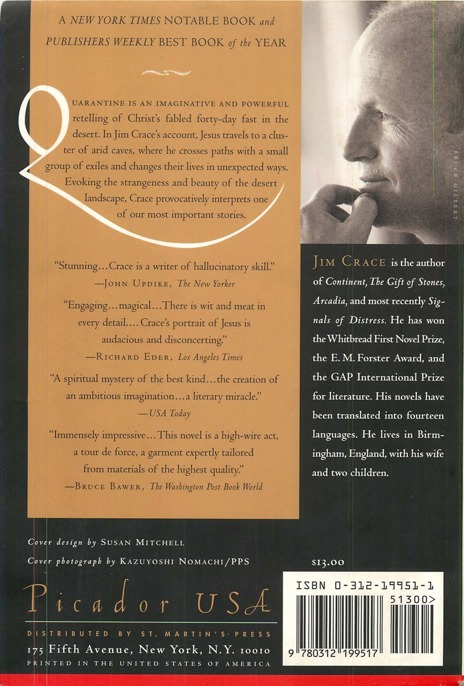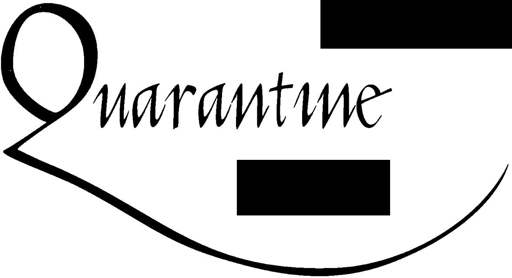Quarantine



Praise for
Quarantine
"Remarkable ... T he effect is almost hallucinatory."
-Frank Kermode, The New York Times Book Review
"Immensely enjoyable ... Mr. Crace's vivid writing brings
his clever take on the Bible to life."
-Elizabeth Bukowski, The Wall Street Journal
"A serious and skillfully crafted novel about folly, faith, and a radically
new relationship between a people and its god."
-R. Z. Sheppard, Time
"Stunning ... extraordinary ... One of the freshest and most inventive
novelistic uses of biblical material I have read."
-Roger K. Miller, Chicago Sun Times
"Unforgettable ... Crace has created an incantatory, compelling novel
that stands beside Camus' The Stranger in its visceral sense of
location and its resolute refusal of moral abstractions."
-Greg Burkman, The Seattle Times
"Quarantine is a brilliantly imagined work ... .Jim Crace is
a landscape artist in prose."
-Boston Book Review
"Troubling ... profound ... impressive."
-Peter Landry, Philadelphia Inquirer
"Daring ... compelling ... original ... [Quarantine]
has moments of pure beauty."
-Commonweal
ALSO UY jiM CRACE
Signals of Distress
Arcadia
The Gift of Stones
Continent


•
JIM CRACE
PICADOR USA
FARRAR, STRAUS & GIROUX
NEW YORK

QUARANTINE. Copyright © 1998 by Jim Crace. All rights reserved. Printed in the United States of America. No part of this book may be used or reproduced in any manner whatsoever without written permission except in the case of brief quotations embodied in critical articles or reviews.
For information, address Picador USA, 175 Fifth Avenue, New York, N.Y. 10010.
Picador® is a U.S. registered trademark and is used by Farrar, Straus and Giroux under license from Pan Books Limited.
For information on Picador USA Reading Group Guides, as well as ordering, please contact the Trade Marketing department at St. Martin's Press.
Phone: 1-800-221-7945 extension 488
Fax:212-677-7456
E-mail: [email protected]
Library of Congress Cataloging-in-Publication Data
Crace, Jim.
Quarantine I Jim Crace.
p. em.
ISBN 0-312-19951-1
l.Jesus Christ-Temptation-Fiction. 2. Bible. N.T.-History of Biblical events-Fiction.
!.Title
[PR6053.R228Q37 1999]
823' .914-dc21
98-51205
CIP
First published in the United States by Farrar, Straus and Giroux
First published in the United Kingdom by Viking Penguin
First Picador USA Paperback Edition: April 1999
10 9 8 7 6 5 4 3 2
An ordinary man of average weight and fitness embarking on a
total fast- that is, a fast during which he refuses both his food and
drink- could not expect to live for more than thirty days, nor to
be conscious for more than twenty-five. For him, the forty days of
fasting described in religious texts would not be achievable- except
with divine help, of course. History, however, does not record an
intervention of that kind, and medicine opposes it.
Ellis Winward and Professor Michael Soule,
The Limits of Mortality, Ecco Press, New Jersey (1993)

J
Miri's husband was shouting in his sleep, not words that she
could recognize but simple, blurting fanfares of distress. When,
at last, she lit a lamp to discover what was tonnenting him, she
saw his tongue was black- scorched and sooty. Miri smelled the
devil's eggy dinner roasting on his breath; she heard the snapping
of the devil's kindling in his cough. She put her hand on to his
chest; it was soft, damp and hot, like fresh bread. Her husband,
Musa, was being baked alive. Good news.
Miri was as dutiful as she could be. She sat cross-legged inside
their tent with Musa's neck resting on the pillow of her swollen
ankles, his head pushed up against the new distension of her
stomach, and tried to lure the fever out with incense and songs.
He received the treatment that she - five months pregnant,
and in some discomfort - deserved for herself. She wiped her
husband's forehead with a dampened cloth. She rubbed his
eyelids and his lips with honey water. She kept the flies away.
She sang her litanies all night. But the fever was deaf. Or, perhaps,
its hearing was so sharp that it had eavesdropped on Miri's deepest
prayers and knew that Musa's death would not be unbearable.
His death would rescue her.
In the morning Musa was as numb and dry as leather, but -
cussed to the last- was gripping thinly on to life. His family and
the other, older men from the caravan came in to kiss his forehead
and mumble their regrets that they had not treated him with
greater patience while he was healthy. When they had smelled
I

and tasted the sourness ofhis skin and seen the ashy blackness of
his mouth, they shook their heads and dabbed their eyes and
calculated the extra profits they would make from selling Musa's
merchandise on the sly. Musa was paying a heavy price, his
uncles said, for sleeping on his back without a cloth across his
face. An idiotic way to die. A devil had slipped into his open
mouth at night and built a fire beneath the rafters of his ribs.
Devils were like anybody else; they had to find what warmth
they could or perish in the desert cold. Now Musa had provided
lodging for the devil's fever. He wouldn't last more than a day
or two - ifhe did, then it would be a miracle. And not a welcome
one.
It was Miri's duty to Musa, everybody said, to let the caravan
go on throughJericho towards the markets of the north without
her. It couldn't travel with fever in its cargo. It couldn't wait
while Musa died. Nor could it spare the forty days of mourning
which would follow. That would be madness. Musa himself
wouldn't expect such waste. He had been a merchant too, and
would agree, if only he were conscious, God forbid, that business
should not wait for funerals. Or pregnancies. Fortunes would be
lost if merchants could not hurry on. Besides, the camels wouldn't
last. They needed grazing and watering, and there was no standing
water in this wilderness and hardly any hope of rain. No, it was
a crippling sadness for them too, make no mistake, the uncles
said, but Miri had to stay behind, continue with her singing till